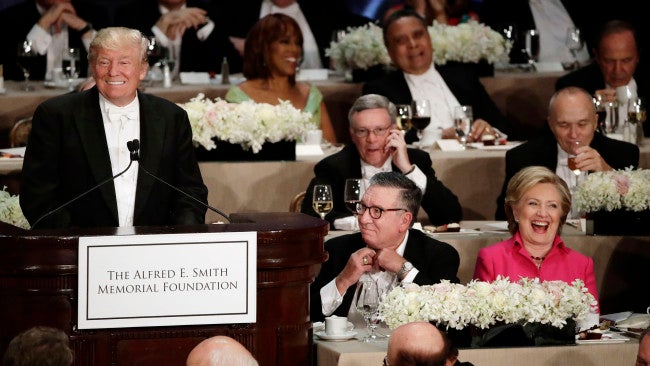Trump, Clinton square off again at roast a day after debate
NEW YORK (AP) – Bitter presidential rivals Hillary Clinton and Donald Trump have one more face-to-face showdown before Election Day. And they’re supposed to make it funny.
The venue Thursday night just 24 hours after their third and final debate is the annual Alfred E. Smith Memorial Foundation Dinner in New York, a white-tie gala that every four years becomes a showcase for presidential politics. Tradition dictates that the candidates deliver humorous remarks poking fun at each other and themselves, a jovial custom that seems hard to envision amid such an ugly campaign.
Trump regularly calls Clinton, “Crooked Hillary,” says he’d put her in jail if he wins the presidency, and declared during Wednesday’s debate that she was “a nasty woman.” Clinton says Trump lives in his own reality, is running a “hateful, divisive campaign” and lacks the temperament to be president.
They sat one seat apart for the evening, with New York’s Cardinal Timothy Dolan acting as the only buffer. And when they entered and took their seats, they did not shake hands or make eye contact.
Both took some early heat from the night’s master of ceremonies, Alfred E. Smith IV, the event’s namesake’s great-grandson. Smith joked that Trump approached Clinton before the event and asked how she was doing, to which Smith responded “I’m fine but now get out of the ladies’ dressing room.”
Trump laughed at the joke, and again when Smith made another joke about the leaked video which captured Trump using vulgar language, saying while the celebrity businessman was “sitting next to a man in a robe, but this is not a locker room. Watch your language!”
Smith also teased Clinton, noting that “titans of Wall Street” were in attendance, but told her to restrain herself from seeking donations and to “remember the children.”
The unprecedentedly bitter campaign between Clinton and Trump could threaten the ecumenical goodwill that has defined previous roasts. Since 1960, at least one of the major party nominees has appeared at nearly every election year dinner, which is traditionally the last time the nominees share a stage before voters go to the polls.
Four years ago, President Barack Obama and Mitt Romney set aside their differences to trade (mostly) warm jokes. Romney, scanning the well-heeled crowd in the gilded Waldorf-Astoria ballroom, joked that the event’s white-tie attire finally gave him a chance to publicly don what “Ann and I wear around the house.” Obama, meanwhile, used his speech that year to look ahead to an upcoming debate on foreign policy, previewing his argument by saying “Spoiler alert: we got Bin Laden.”
The roast might feel familiar to Trump, who infamously glowered through Obama’s jokes at his expense during the 2011 White House Correspondents Dinner and is not known for being self-deprecating. Last weekend, he tweeted that he did not appreciate Saturday Night Live’s portrayal of him in a sendup of the candidates’ performances in the second presidential debate.
This is the first time that both party’s nominees hail from New York State as a crowd of about 1,500 gathers for the distinctly Gotham event, held each October. Attendees pay between $3,000 and $15,000 to attend the dinner, which raises about $5 million to provide services for impoverished children, Zwilling said.
The dinner is named after the former New York governor, who was the first Catholic to receive a major party nomination for president when he unsuccessfully ran in 1928. And fittingly for an event named after a man nicknamed “The Happy Warrior,” the occasion has produced dozens of memorable presidential jokes.
In 2000, then-Texas Governor George W. Bush gazed upon the glitzy gathering and declared: “This is an impressive crowd, the haves and the have-mores. Some people call you the elite. I call you my base.”
That same year, Vice President Al Gore touted his campaign trail ability to weave in stories “of real people in the audience and their everyday challenges.”
“Like the woman here tonight whose husband is about to lose his job,” Gore continued. “She’s struggling to get out of public housing and get a job of her own. Hillary Clinton, I want to fight for you.”
And in 2008, John McCain joked about the exalted manner in which the media venerated Obama, noting that “‘Maverick’ I can do, but ‘Messiah’ is above my pay grade.” But he wound down his remarks with a note of grace that, to this point, has been largely absent from the 2016 campaign.
“I can’t wish my opponent luck,” McCain said, turning toward Obama, “but I do wish him well.”
